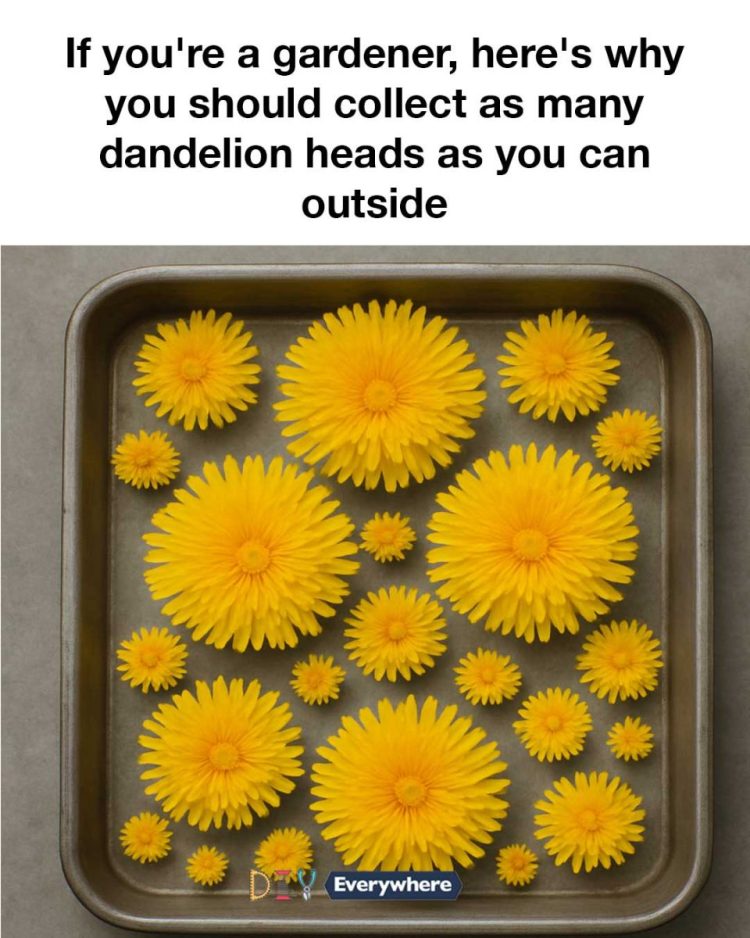For many gardeners, dandelions are often considered pesky weeds that invade lawns and gardens. However, these bright yellow flowers hold a treasure trove of benefits that can be harnessed by the savvy gardener. Collecting dandelion heads can transform what many see as a nuisance into a valuable resource for your garden and beyond.
From natural fertilizers to culinary delights, dandelion heads offer a wide array of uses that can enhance your gardening experience. By understanding the potential of these humble flowers, you can not only improve your garden’s health but also contribute positively to the local ecosystem. Let’s explore the many reasons why you should start collecting dandelion heads today.
1. Natural Fertilizer: Boost Your Soil Health
Dandelion heads are rich in nutrients that can be used to create a natural fertilizer for your garden. When dandelion heads decompose, they release essential minerals such as potassium, calcium, and magnesium into the soil, which are vital for plant growth. To make a simple dandelion fertilizer, collect a large number of dandelion heads and steep them in water for about two weeks. Use a ratio of about 1 part dandelion heads to 5 parts water. Once the mixture has fermented, strain it and dilute it with water at a 1:10 ratio before applying it to your plants.
This natural fertilizer not only enriches the soil but also improves its structure, enhancing water retention and aeration. By using dandelion heads as a fertilizer, you can reduce your reliance on chemical fertilizers, promoting a more sustainable gardening practice.
2. Dandelion Tea: A Nutrient-Rich Brew for Your Plants
Dandelion tea is another excellent way to utilize dandelion heads for the benefit of your garden. This nutrient-rich brew can be used as a foliar spray or soil drench to provide your plants with a boost of vitamins and minerals. To make dandelion tea, fill a bucket with dandelion heads and cover them with water. Let the mixture steep for about 24 hours, then strain the liquid.
Apply the dandelion tea directly to the leaves of your plants or pour it around the base of the plants to improve nutrient uptake. The tea is rich in potassium and other trace elements that can enhance plant growth and resilience, making it a valuable addition to your gardening routine.
3. Pest Control: Keep Unwanted Insects at Bay
Dandelion heads can also play a role in natural pest control. The strong scent of dandelions can deter certain pests from invading your garden. By creating a dandelion spray, you can protect your plants from unwanted insects without resorting to chemical pesticides. To make the spray, blend dandelion heads with water and strain the mixture. Use a spray bottle to apply the solution to your plants.
This natural pest deterrent can help keep aphids, mites, and other common garden pests at bay. Additionally, by maintaining a healthy population of dandelions in your garden, you can attract beneficial insects like ladybugs and lacewings, which prey on harmful pests.
4. Composting: Enhance Your Compost Pile
Adding dandelion heads to your compost pile is an excellent way to boost its nutrient content. Dandelions are rich in nitrogen, which is a crucial component of the composting process. By incorporating dandelion heads into your compost, you can accelerate the decomposition process and produce richer compost.
To use dandelion heads in composting, simply mix them with other green materials such as grass clippings and kitchen scraps. Ensure a balanced ratio of green to brown materials to maintain a healthy compost pile. The resulting compost will be teeming with nutrients that can be used to enrich your garden soil.
5. Seed Saving: Grow Your Own Dandelions
see continuation on next page
